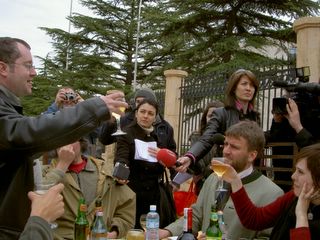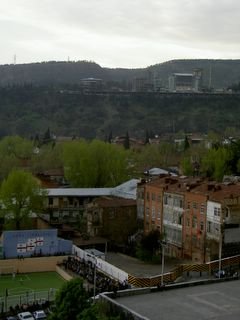Wine Protest: Drinking Olympics on Television

press

Media Fanfare at the Wine Protest
It is nearly midnight here and my heart is still racing. I have felt tipsy since around 2PM today. When our friend suggested a celebration of Georgian wine in front of the Russian embassy in protest to the Russian ban of Georgian wine, I thought it might be a fun field trip. You may ask, why ban the closest producer of wine to Russia? Well, scientists found too many pesticides and other pollutants in the wine, which actually comes from the massive counterfeit problem that the Russians have of Georgian wine, cigarettes and loads of other things.
As it was a work day and we had planned it to coordinate with the lunch hour so the rusetis elchi, or Russian Ambassador would see us outside the embassy with dinner table complete with 15 or so chairs, table full of food, on a spanking white table cloth (which would not stay so white with the amount of wine that was being drunk). Did I mention there were more journalists and camera crew members than participants in our non-protest? Yes, there were several TV stations, radio crew and independent media there, all to watch foreigners drink wine in the middle of the day on the sidewalk and toast to Georgia. Did I also mention this was the first or second news story on all the TV news stations that day: that is probably what I find the most incredible of this crazy story. In other countries, we would not be the lead story but would probably get coverage. It really says a lot about Georgian pride or the fact there was NOTHING to report today. The other main story was on the 100 year anniversary of the Duma in St. Petersburg. Nino Burjanadze, the speaker of Parliament in Georgia went there and was critical of the Russians and their politics/economics. Zhirinovsky, a Russian MP then starts wailing on camera about how they fed the Georgians for 200 years and this is what they get, just insults with every 3rd or 4th word was Bliyat, whore. I swear Georgian TV is more serious than this. It seems like it is a bit of a clown act from the Russians and the foreigners protest, but it really isn't.
The Krombacher, a supra-event style restaurant across the street, agreed to transport the food, table, chairs for our event free of charge. The owner said that it would be hard, but he is a nationalist of course.
There was one part on television not on this television clip which was way later on, long after the "hour" allotted for the supra expired and everyone was staggeringly drunk, when I was saying "Ra kargi rvino-a" in Georgian meaning good wine this is. It was quite surreal. The funny thing is is that someone of the stations reported it as the Georgians paid for the Supra or celebration but invited foreigners to taste free wine. It is a example of how something so simple can be skewed by news agencies. We are wondering when to do it again. I mean, what a country. You have a nice outdoors lunch with a LOT of wine and you make the news on several stations in several countries. :)
My name was reported for some odd reason as Ruth Berger, so I have been given a Jewish name and turned from a hill into a mountain, in German nonetheless. What were they thinking is my question?
Some news links on the event
http://www.apsny.ge/news/1146178959.php
http://www.vz.ru/news/2006/4/27/31633.html
http://www.newizv.ru/lenta/45519/
http://www.apsny.ge/news/1146165848.php
http://kavkaz.memo.ru/newstext/news/id/987920.html
http://www.newizv.ru/lenta/45519/
http://www.day.az/news/georgia/47477.html
http://lenta.ru/news/2006/04/27/table/
http://echo.msk.ru/news/307846.html
http://www.from-ua.com/news/4450cdbc06601/
http://www.gazeta.ru/lenta/2006/04/27/news_626923.shtml
http://www.apsny.ge/news/1146100814.php
http://www.vesti.ru/news.html?id=90792
























